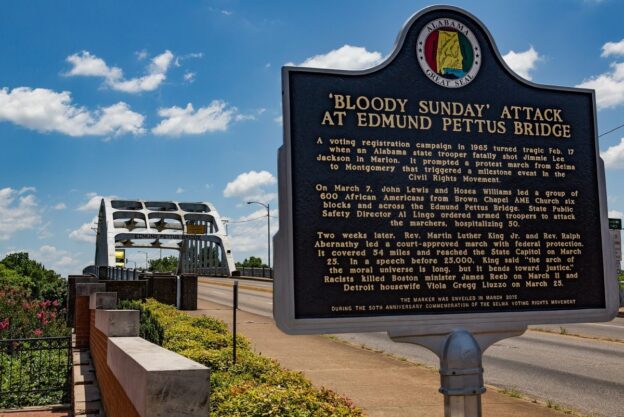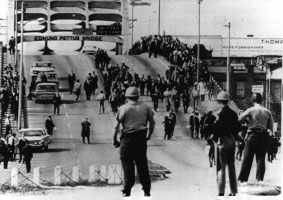While they were talking about this, Jesus himself stood among them and said to them, “Peace be with you.” They were startled and terrified, and thought that they were seeing a ghost. He said to them, “Why are you frightened, and why do doubts arise in your hearts? Look at my hands and my feet; see that it is I myself. Touch me and see; for a ghost does not have flesh and bones as you see that I have.” And when he had said this, he showed them his hands and his feet. While in their joy they were disbelieving and still wondering, he said to them, “Have you anything here to eat?” They gave him a piece of broiled fish, and he took it and ate in their presence.
Then he said to them, “These are my words that I spoke to you while I was still with you—that everything written about me in the law of Moses, the prophets, and the psalms must be fulfilled.” Then he opened their minds to understand the scriptures, and he said to them, “Thus it is written, that the Messiah is to suffer and to rise from the dead on the third day, and that repentance and forgiveness of sins is to be proclaimed in his name to all nations, beginning from Jerusalem. You are witnesses of these things. And see, I am sending upon you what my Father promised; so stay here in the city until you have been clothed with power from on high.
There goes Jesus eating again. Eating fish with fisherman. Have you ever read through the Gospels and noticed how often Jesus is eating? Why is that? With the exception of birthday parties and my wedding, I really don’t think I would have anyone include meals in my biography. So why waste the precious ink?
Believe it or not, I think eating was central to Jesus’ mission. That’s right, the mundane and ordinary routine of sharing fellowship over a meal was a staple to Jesus’ missional diet, and I think this carries forward to the church today as well. In fact, I think there is a missional motif in Luke’s Gospel revolving around the word “fish.” So we shouldn’t be surprised to find the fisher of men eating fish with his fishermen disciples in this scene. Yes, we could spend all day talking about eating the fish and the significance of it for Jesus’ physicality of being raised from the grave. But, I think the fish points to something else, a sign, a symbol, a reminder of who the disciples are called to be and what they are called to do.
Besides our passage, there are three other places where we find the word “fish” in Luke’s Gospel.
Back in Luke 5 there is a crowd surrounding Jesus while he’s teaching God’s Word when all the sudden he sees some fishermen washing their nets. They are a little down because they worked hard all night and couldn’t land a catch. You know how the story goes. Jesus gets into Peter’s boat, continues teaching the crowds, and tells Peter where to cast the nets. They pull in the motherlode, so much so that the large quantity of fish causes the boat to sink. Swept off his feet, Peter falls down at Jesus’ feet and says, “Go away from me Lord, for I am a sinful man!” James and John, likewise, were frozen in fear. Jesus tells them, “Do not fear, from now on you will be catching people.” Fishing for people, eh? They drop everything and follow him.
Next we encounter another miraculous event, Jesus feeding the multitudes the 5,000. Prior to the miraculous feeding, Jesus sends the disciples out on a mission. After a quick debrief, the disciples ask Jesus to send away the crowds so that the crowds can find lodging and food. Jesus snaps back, “You feed them.” Baffled, the disciples say they only have five loaves and two fish, which cannot possibly feed everyone. Jesus tells them to set the people in rows of 50, then he gives thanks to God, blesses it, breaks the bread, and kept handing them to the disciples until all ate and were satisfied. The broken pieces that were leftover were picked up, which were 12 baskets full. Sounds eerily similar to God providing manna in the wilderness to the Israelites. Mary’s prophetic prayer that Jesus “has filled the hungry with good things” seems to have been fulfilled. Fishing and feeding.
The last reference to fish is with regard to prayer. Jesus compares praying to God, like a son asking his father for a fish. Of course the parent isn’t going to give the son a snake instead of a fish. Who would do that? Then Jesus says, “How much more then, will your heavenly Father give you the Holy Spirit to those who ask him?” Fishing, feeding, and the gift of the Holy Spirit. Hmm.
Fast-forward to the Emmaus Road. Our congregation loves the “Walk to the Emmaus” so I’ll trust you are familiar. In that scene Cleopas and his fellow companion are walking on the road to Emmaus when a guy interrupts and decides to join them. They do not recognize that the person travelling with them is Jesus until he breaks the bread. Like Jesus breaking the bread before feeding the multitudes, or breaking the bread for the Last Supper, it is in the breaking of bread in which their eyes were opened and they realized that Jesus was in their midst. Strangely enough our passage follows the Road to the Emmaus. After Jesus eats the fish he opens their minds to Scripture, and how he is revealed in it so that the disciples might be His witnesses. Bread and Fish. Hmm. Sounds familiar. Anything in our passage about the Holy Spirit? Well immediately after our passage Jesus tells the disciples to wait to be clothed on High, that is, filled with the Holy Spirit at Pentecost before they go out. Hmmm. Do you see a pattern here?
If I am losing you, let me try to reel you back in: the disciples are fed in order that they may go out and feed the multitudes. You know the saying, “Give a man a fish and you feed him for a day; teach a man to fish and you feed him for a lifetime.” A huge proportion of Jesus’ ministry was teaching these fishermen how to fish for God’s kingdom. And guess what, it’s not as complicated as you might think. Preparation for effective ministry comes through studying God’s Word and being empowered by the Holy Spirit through prayer. Simple enough. You don’t have to be an apostle to do that.
Sometimes I think we make church way more complicated than it has to be. What if it was as simple as studying God’s Word, Spirit-filled prayer, and going out and feeding people physically, emotionally, and spiritually? We should all take seriously Jesus’ command before the miraculous feeding: “you feed them.” He’s equipped us. What are we waiting for?
Remember how much we see Jesus eating with people all the time in the Gospels? The simple and uneventful act of eating with people was central to his mission, and it’s not that difficult. That’s what the early church did. They met with one another in their homes, breaking bread, and telling others about Jesus. Likewise, when we invite others to share a meal, this is extremely meaningful cross-culturally. When we eat together, we discover the inherent humanity of all people. We share stories, hopes, fears, and disappointments. People open up to each other. And we can open up to them to share the same things, including telling them about the truly human one…
Hear this letter from the 4th century Emperor Julian to his officials about those pesky, atheist Christians, their hospitality, and the fear that they will take over the Roman Empire with their meals:
We must pay special attention to this point, and by this means affect a cure [for the “sickness” of Christianity]. For when it came about that the poor were neglected and overlooked by the [pagan] priests, then I think the impious Galileans [Christians] observed this fact and devoted themselves to philanthropy. And they have gained ascendancy in the worst of the deeds through the credit they win for such practices. For just as those who entice children with a cake, and by throwing it to them two or three times induce them to follow them, and then, when they are far away from their friends cast them on board a ship and sell them as slaves…by the same method, I say, the Galileans also begin with their so-called love-feast, or hospitality, or service of tables—for they have many ways of carrying it out and hence call it by many names—and the result is that they have led very many into atheism [i.e. Christianity]. (from Michael Frost’s Five Habits of Highly Missional People, p. 12)
Imagine that? Sharing meals and sharing Christ with others was subversive to the Roman Empire. They feared that the Christians would take over.
Michael Frost in his Five Habits of Highly Missional People helps us out with the who, what, and how of eating meals with others. It’s really pretty simple, and not complicated. Look, most of us eat 21 meals a week. Let’s be honest. We Memphians might have even more. But dedicate at least three meals with others a week. That’s not too hard. Get into that rhythm, and then it becomes a habit.
So what does a meal look like? Well it can be as grand as an ornate, elaborate dinner party or the bare minimum of coffee and a donut.
Whatever it may be, sit across the table from three people this week and talk. Who should we eat with? Frost suggests that we missionally eat with one person who is not a church-goer. If you want to take this further, eat with someone who may or may not be able to repay you. But, don’t be surprised if people invite you over for a meal, in return. And don’t be surprised by their eating habits.
Also, eat with fellow disciples. I recently started something called “Table Groups.” This is a young adult initiative where we meet and eat together. We share life. We pray. We encourage one another. There are various components that I try to incorporate into our time. One might call it a table liturgy. I’d love to see this implemented on a church-wide scale. It would foster community and intergenerational fellowship, and guess what? It’s modeled after the early church. It’s not complicated. We can grow as a church by doing the simple act of eating and sharing our lives with one another around a table. If this is something that you might be interested in doing, please talk to me after the service, or email me. I’d love to see us get to know one another on a more personal level by just being human and connecting through breaking bread.
So, let’s feed people physically, emotionally, and spiritually. Let’s get in a habit of eating with at least three people per week, one being a non-churchgoer. Let’s grow in fellowship so that we can mutually encourage one another as we go fishing.
I still find one of the most fascinating things in the world to ponder about is that when Jesus wanted his disciples to reflect on his death, he didn’t give them a theory, but a meal. Let’s now prepare ourselves for his meal: may our eyes be opened to Jesus in the breaking of the bread. May our minds be opened to the Word we just heard, and may we be fed so that we can go out and bring more people to feast with us here.
 That is how Christianity spread. These Christians lived in such a way that it raised eyebrows, piqued curiosity, and drew interest. Like a centripetal force, people were drawn in by this Way and asked questions, to which these funny Christians declared the Lordship of the crucified and resurrected King.
That is how Christianity spread. These Christians lived in such a way that it raised eyebrows, piqued curiosity, and drew interest. Like a centripetal force, people were drawn in by this Way and asked questions, to which these funny Christians declared the Lordship of the crucified and resurrected King.




